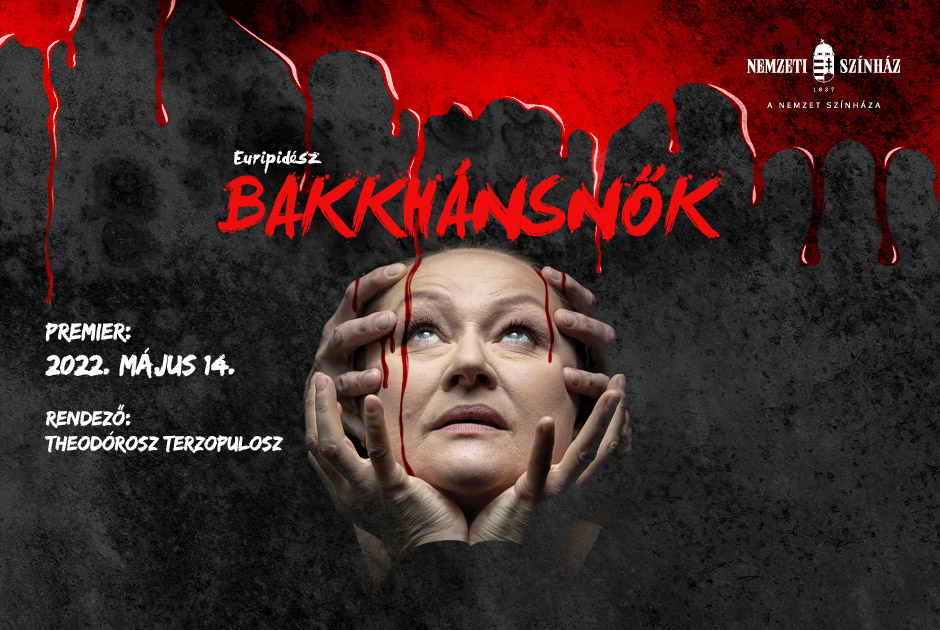AUDIENCE MEETINGS
AUDIENCE MEETINGS

National Theatre, Budapest, Hungary
Director: Theodoros Terzopoulos
In Hungarian, during MITEM with English subtitles
1 hours 30 minutes, without breaks.
“What people thought would happen never did. / What they did not expect, the gods made happen.”
Dionysus, the god of wine and ecstasy, returns to Thebes to take revenge on King Pentheus who refuses to acknowledge his divine nature. Dionysus turns the city’s high-ranking women into frenzied Bacchae (Bacchantes). (The word Bacchae comes from Bacchus, the Roman equivalent of Dionysus, whose servants are called Bacchantes.) The women eventually march off to Mount Cithaeron. They have in their midst Agave, the king’s mother, who turns mad and in her frenzy, tears his own son apart with her bare hands.
– The conflict between Dionysus and Pentheus is that between instinct and logic. When neither can moderate itself, that has a cruel consequence for humans, says Director of The Bacchae, Theodoros Terzopoulos. – This is, perhaps, the most profound of all Greek tragedies. It is asking a key ontological question: what is a human being?
The Bacchae is one of the last plays of Euripedes (5th century BC), an outstanding ancient Greek playwright. It premiered only after his death, presented by his own son, and won him first prize. Subsequently, it had many controversial interpretations and adaptations. It is clearly one of the best-known works of the classical Greek era: as its source, it drew on the Dionysus cult, and became its sole theatrical relic. According to Wolfgang Goethe, it is Euripides’ best play.
Greece’s Theodoros Terzopoulos is a great master of world theatre. He started his four-decade-long career with The Bacchae, when he founded his innovative/experimental company Attis; and he has been looking for contemporary ways to present ancient Greek theatre ever since. His book The Return of Dionysus, a method of theatre and training, has been translated into a dozen languages. It was at his initiative that the Theatre Olympics, one of the most prestigious contemporary theatre festivals, began in 1996, founded by the classics of global theatre (Theodoros Terzopoulos, Robert Wilson, Heiner Müller, Yuri Lyubimov, Tadashi Suzuki) – Theatre Olympics 2023 is scheduled to be hosted by Hungary.
Based on the translation by Gábor Devecseri, the script was written by András Kozma.
Roland Bordás
Péter Herczegh
Nelli Szűcs
Ádám Schnell
József Szarvas
József Kovács S.
József Varga
Chorus, Ladies from the Palace, Wailing Ladies:
acting students of the Rippl-Rónai Faculty of Arts of Szent István University;
Lujza Lili Battai, Bence János Bognár, Kata Duma, Raul Gabriel Ionescu, Tamás Jakab, Péter Juhász, Benjámin Dominik Kerék, Anna Gizella Kiss, Robert Dávid Krauter, Júlia Mikita Dorka, Anita Polyák, Ákos Puskás Balázs, Karina Russa, Dániel Séra, Ilka Sipos, Márk Wettstein, Ábel Tamás Winkler.
Theodoros Terzopoulos
Panayiotis Velianitis
Savvas Stroumpos
András Kozma
Panagiota Lotsou
István Lencsés
Krisztián Ködmen
Anikó Sütő
Gábor Vida
Theodoros Terzopoulos